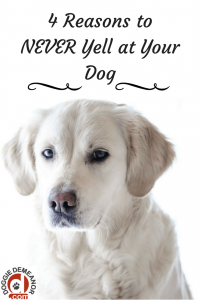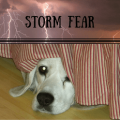 There are many reasons people yell at their dogs, and in some cases it may even be well-intentioned. But, dogs lack certain reasoning skills, so even when yelling is well-intended, the lesson will usually fail to be learned. In fact, the result is that of travelling a backward path, where you may end up instilling negative behaviors that are difficult to reverse.
There are many reasons people yell at their dogs, and in some cases it may even be well-intentioned. But, dogs lack certain reasoning skills, so even when yelling is well-intended, the lesson will usually fail to be learned. In fact, the result is that of travelling a backward path, where you may end up instilling negative behaviors that are difficult to reverse.
Top 4 reasons you should NEVER yell at your dog…
- Fearful Dog
Harsh punishments bestowed upon a dog can cause fear which is never a good, or helpful, outcome. Dogs that are repeatedly yelled at in a harsh manner are at risk of developing fear aggression. Dogs with fear aggression may growl, show their teeth, or even bite when they feel cornered, or put in any type of fearful situation. These dogs aren’t mean in any way; it is more like a reflex reaction in an attempt to remove the cause of the fear. In addition, yelling or punishing them for this reaction can end up making things worse.
- Sneaky Dog
Ah, so you’ve yelled at Fido for peeing on the carpet, again. So, why is it that he now pees on the carpet only when you’re not looking? Yes, you’ve created a sneaky dog. He knows that he can’t get away with it while you’re looking, but doing it while you’re not looking seems to work out just fine. This can go for yelling at your dog for chewing the sofa, stealing from the garbage, sleeping on the furniture, or anything else you may decide to yell about.
- Confused Dog
Yelling at a dog after-the-fact is the equivalent of yelling at a brick wall. Your dog doesn’t have that good of a memory, and therefore lacks the capability to make the correlation between prior bad behavior and whatever it is you are yelling about. It may release frustration for you, but the only thing it accomplishes for your dog is confusion. Oh, he may cower and look guilty as though he knows exactly what he has done, but don’t be fooled! He is only sensing your anger (because dogs are intuitive like that) and reacting to it.
- Barking Dog
Many, many, many (have I mentioned it’s, ‘many’??) dog owners yell at their dogs when they bark. It is a natural reaction, after all. But, if you think it is doing any good, think again! So, here you are putting your dog in his place by yelling at him to STOP! Meanwhile, your dog is thinking how very wonderful it is that you agree with him, and yes, the cat should be barked at because surely you must be barking too! That’s right, barking makes lots of noise, and if you chime in and make lots of noise too, then your dog will assume you are in agreement. What to do? One effective method is to completely ignore your dog when he barks, but treat and praise him whenever he stops. Another method is to teach your dog the “quiet” command. Or, simply figure out what triggers the barking, and remove the trigger. Keep in mind that a bored dog, or a dog with pent up energy, are the types of dogs most likely to be barkers. So, sometimes solving barking issues is as easy as making sure your dog gets plenty of exercise, and mental stimulation.
Instead of Yelling at Your Dog, Do This…
The best way to train your dog is, of course, not through yelling, but through positive reinforcement. This is what dogs understand far better than anything else. When they do something right, and you reward them with treats, verbal praise, or play time, that is when they start to think, “Oh! That’s what she wanted!” And that is when dog owners begin to reap the benefits of all their training efforts.
Rewards need to be given immediately after the desired behavior occurs. In fact, studies show that the quicker the reward is given, the quicker the dog catches on. That is one reason why clicker training has proven to be so successful. Humans can click quickly, and dogs quickly learn to associate the sound of that click with positive rewards. You can still get great results without using clicker training though; it certainly isn’t the only method.
Once a dog begins to understand that desired behaviors lead to good things, he will want to do them over, and over again. And, since yelling isn’t a “good” thing to a dog, that is why it just doesn’t work.
Practice makes perfect, so be sure to practice skills daily, and keep doing them even after the skill has been learned. Practicing and repeating skills, being consistent in your approach, and always using the same command words is key if you want your dog to first, learn the skill, and second, remember it.
All dogs learn at a different pace, and some skills will prove more difficult to learn than others. A dog’s attention span is short, so always train in short spurts, otherwise he will get bored and want nothing to do with it. If ever you feel yourself getting impatient, or frustrated because your dog just isn’t getting what you want him to do, just stop and go back to it another time. You should never allow your dog to sense your frustrations as they are much better learners when positive things are associated.
Lastly, always remember to make it fun! This will lead to a human-to-dog bond you can cherish for a lifetime! 🙂







Thank you…I found this quite by accident~serendipity
dru
You’re quite welcome! 🙂
How can I stop a pack of 10 Chinese Cresteds from barking when I can’t remove the trigger?
This was well written and on point! Understanding your dog or even the breed is so important also. Triggers vary according to breeds as well.
Hi, good article.. am from India. I have a golden lab of 13 months. He used to sleep all through the night until recently.
Since about a month to 45 days hes been waking up way too early and not at a fixed time like earlier. He barks and wakes up everyone at home and neighbours as well. Why do you think it is? I asked the vet and he prescribed anti anxiety meds that am not very comfortable giving. Though it is herbal. Hes slso become reactive to other dogs. The vet said he has smelled a female. How can that be avoided? How do I tackle this? I have seen articles that ask setting alarm earlier and then pushing it forward. Its not possible as I am not sure of his waking time. I cannot ignore as his barking wakes the neighbours. He gets sufficient exercise and playtime. I am always with him never alone. Ah! Every 2 days once he wants change of food. He’ll have home cooked food for 2 days or so and then get bored and starves until I give him kibble. Again continues 2 days on kibble then he wants home food or yogurt rice. Please help
First let me say I am not a veterinarian, dog trainer or animal behaviorist, and though I do try to give my best advice and opinions, it should never replace that of a professional. That being said, with the limited information you are able to give just in the comments here, it makes it very difficult to determine what’s going on without seeing your dog and being able to ask questions. You ask about night barking, why your dog has become reactive, and about food habits. There are so many different causes to each of these issues. I’m assuming your vet has asked many questions prior to prescribing anxiety meds so I’m assuming it was determined your dog has anxiety. Separation anxiety certainly is not uncommon in dogs. You say you are always with your dog and that he is never alone, but I’m wondering if this is the case at night? If your dog has separation anxiety and he is left to sleep in a crate or a different room this could be the cause of the barking. If it is possible for your dog to sleep in the same room perhaps that would end the barking? But there are many reasons for night barking, he could be barking at noises he hears in the night, or even due to a medical issue that makes him uncomfortable. You also ask why your dog has become reactive to other dogs. Have you worked on socialization with your dog? And has your dog been neutered? These things can help. As for the food issue, your dog could be outsmarting you knowing that you will offer him something better each time he refuses what you’ve given him. But, again, these are guesses from what little I know and I would suggest having another talk with your vet, or a dog trainer who could have the opportunity to ask more in depth questions about your dog as well as have you try different solutions until you find a fix. Best of luck!